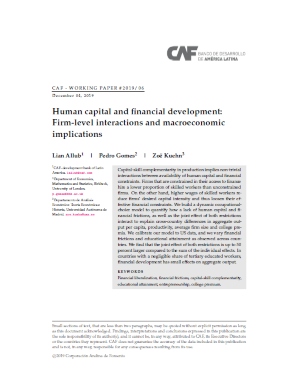Mostrar el registro sencillo del ítem
Financial Frictions, Occupational Choice and Economic Inequality
| dc.contributor.author | Allub, Lian | |
| dc.contributor.author | Erosa, Andrés | |
| dc.coverage.spatial | Brasil | es_ES |
| dc.date.accessioned | 2017-04-04T21:34:46Z | |
| dc.date.available | 2017-04-04T21:34:46Z | |
| dc.date.issued | 2012-12-10 | |
| dc.identifier.citation | Allub, L., & Erosa, A. (2012, December 10). Financial Frictions, Occupational Choice and Economic Inequality. CAF – Working paper;N° 2012/15, Caracas: CAF. Retrieved from https://scioteca.caf.com/handle/123456789/1024 | en |
| dc.identifier.uri | https://scioteca.caf.com/handle/123456789/1024 | |
| dc.description.tableofcontents | We develop a quantitative theory of entrepreneurship, income inequality, and financial frictions disciplined with household data from Brazil. The theory extends Lucas (1978) by modeling heterogeneity in two skills: -working and managerial skills. Consistently with the evidence, the theory implies three occupational categories: workers, employers, and self-employed entrepreneurs. We find that the correlation between working and managerial skills matters importantly for the distribution of earnings across occupations and for the quantitative implications of financial frictions. We also find that while most households benefit from a reform that eliminates enforcement problems, the majority of employers (about two thirds) lose from the reform. By depressing the demand for labor, limited enforcement depresses the equilibrium wage rate, increasing the profits of employers. Our theory thus suggests that employers in Brazil may have a vested interested in maintaining a status quo with low enforcement. | es_ES |
| dc.language.iso | en_US | es_ES |
| dc.publisher | CAF | es_ES |
| dc.relation.ispartofseries | CAF – Working paper;N° 2012/15 | |
| dc.rights | CC-BY-NC | es_ES |
| dc.rights.uri | http://creativecommons.org/licenses/by-nc/4.0/ | es_ES |
| dc.subject | Economía | es_ES |
| dc.subject | Investigación socioeconómica | es_ES |
| dc.title | Financial Frictions, Occupational Choice and Economic Inequality | es_ES |
| dc.type | workingPaper | es_ES |
| dc.publisher.city | Caracas | es_ES |
Ficheros en el ítem
Este ítem aparece en la(s) siguiente(s) colección(ones)
-
6.1 Documentos de trabajo en investigación socioeconómica
En esta colección se encuentran los documentos de trabajo sobre temas económicos y sociales prioritarios para la región.





